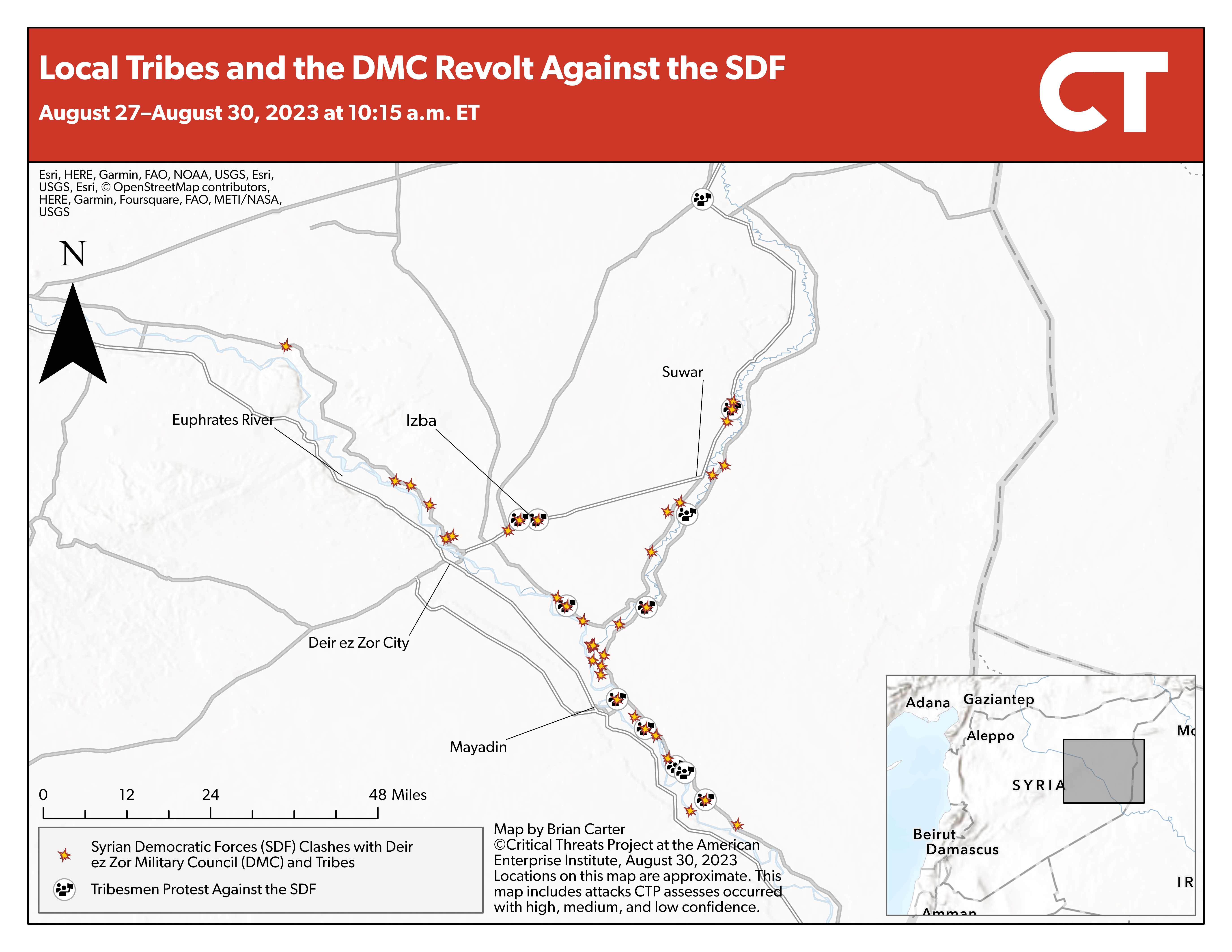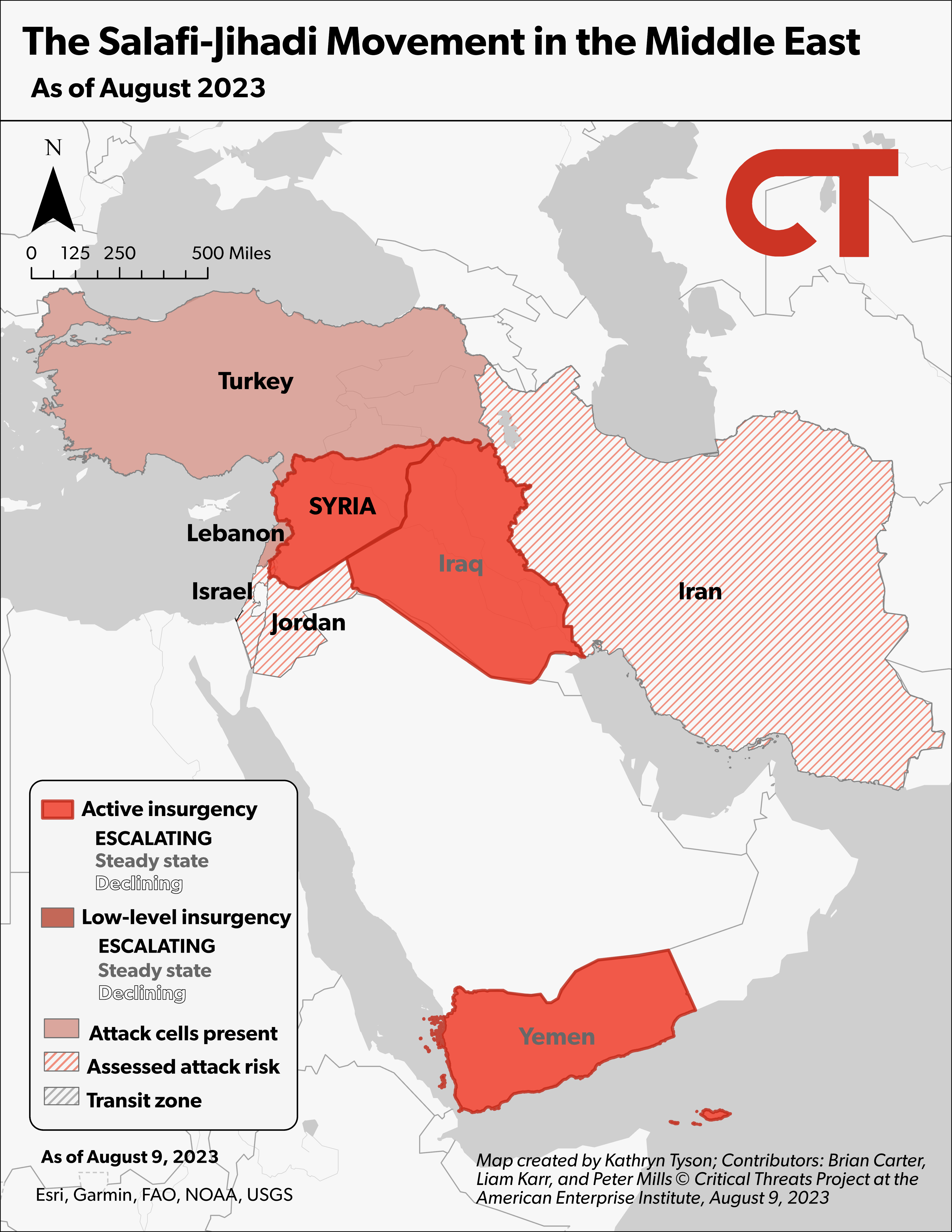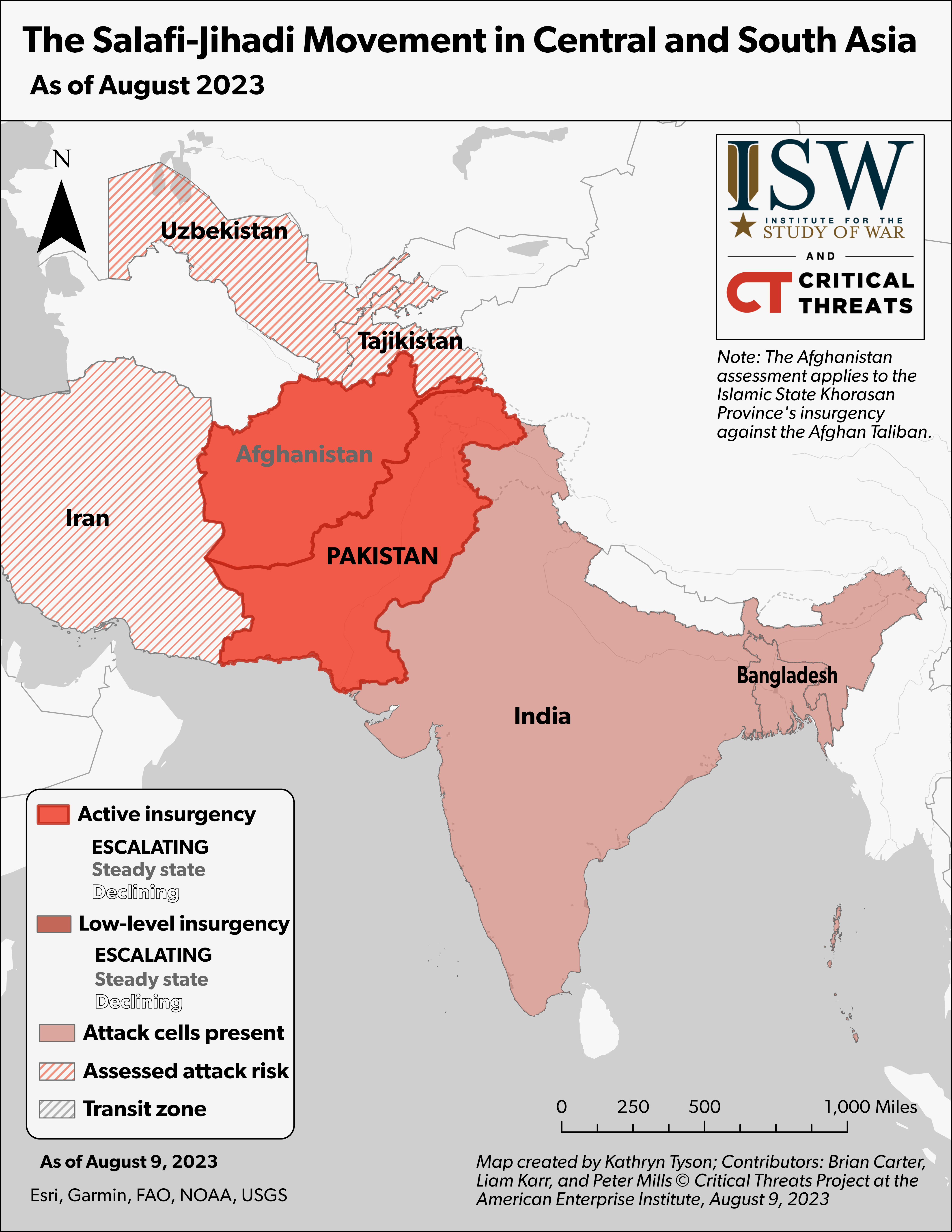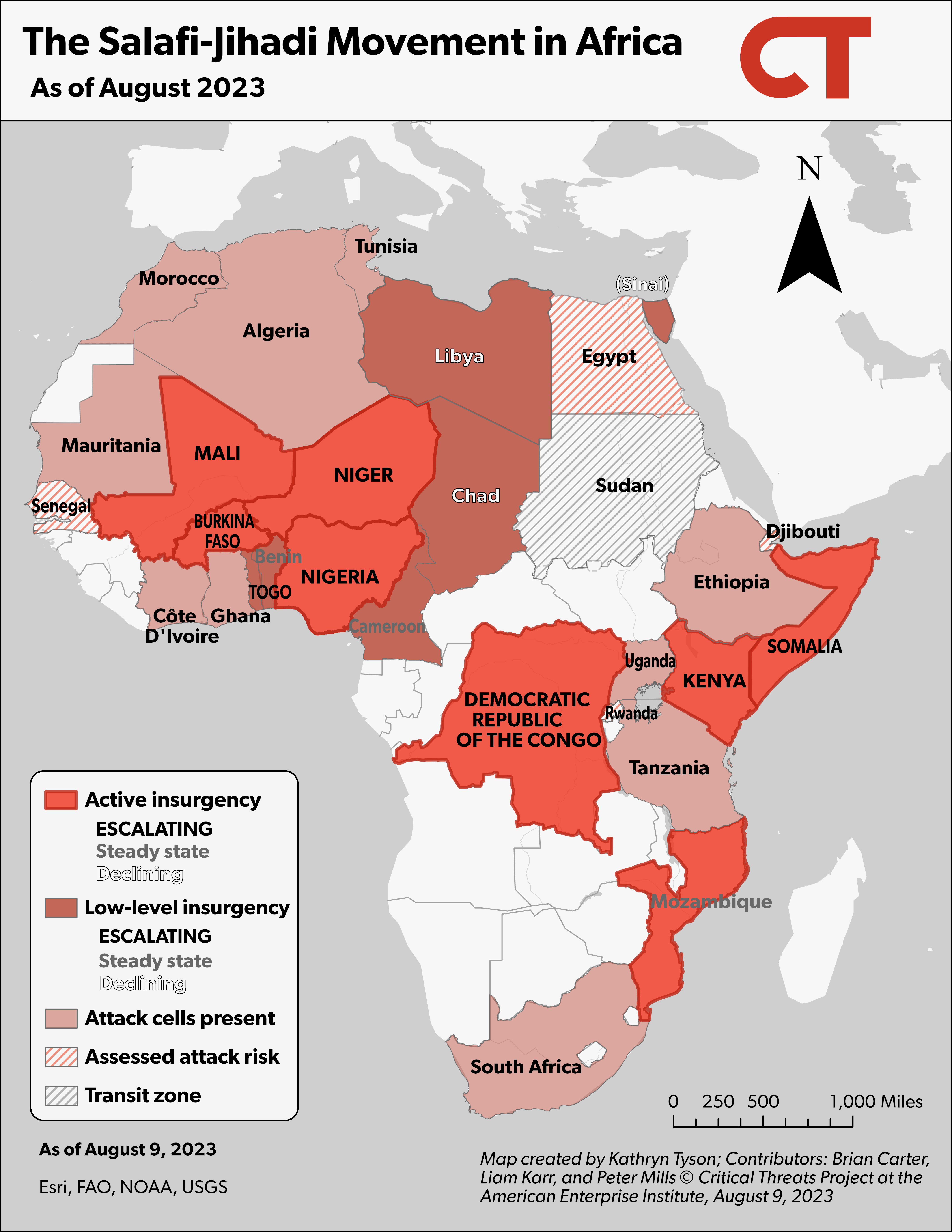Authors: Brian Carter, Kathryn Tyson, Peter Mills
Data Cutoff: August 30, 2023, at 10 a.m.
Key Takeaways:
Iraq and Syria. Local tribes are resisting the Syrian Democratic Forces’ (SDF) campaign against the Deir ez Zor Military Council (DMC), which could enable ISIS to re-embed itself into in local Sunni Deir ez Zor tribes.
Pakistan. Pakistan deployed security forces to protect state energy infrastructure from ongoing protests. The protests may continue through mid-September because the Pakistani government cannot address the issues that prompted them. Deploying additional police to address the protests could disrupt Pakistan’s counterterrorism operations against Tehrik-e-Taliban Pakistan (TTP).
Afghanistan. The Afghan Taliban are conducting an information campaign that frames Tajikistan as responsible for the actions of Islamic State Khorasan Province (ISKP). The framing aims to deflect responsibility for the Taliban’s inability to defeat ISKP and prevent attacks beyond Afghanistan.
Assessments:
Iraq and Syria
Author: Brian Carter
Local tribes are fighting the SDF in response to the SDF’s campaign against the DMC, which could enable ISIS to re-embed itself into local Sunni Deir ez Zor tribes. The SDF arrested DMC commander Ahmed Abu Khawla on August 27 and began moving reinforcements into Deir ez Zor province on the same day.[1] The arrest spurred major clashes between Arab tribes and the DMC and SDF.[2] Both sides have suffered dozens of casualties in the fighting, making these clashes deadlier and more significant than the previous SDF-DMC clashes in July 2023.[3]
Local tribes are organizing an armed resistance, which will provide ISIS an opportunity to re-embed itself in these communities.[4] Since 2003, ISIS and its predecessors previously hijacked organic resistance groups and subverted them to their own gain on multiple occasions in both Syria and Iraq.[5] The SDF dispatched reinforcements from other areas, including Raqqa and southern Hasakah province, to support operations in Deir ez Zor, which will provide ISIS opportunities to move cells and conduct attacks on now less-protected areas.[6] ISIS conducts attacks in Hasakah and uses SDF-controlled Raqqa as a logistics corridor.[7]
- ISIS has historically hijacked resistance against local security forces for its own gain in Iraq and Syria. ISIS’s predecessor Al Qaeda in Iraq (AQI) gradually subverted the Awakening Movement that defeated AQI and recruited some of its fighters after the Iraqi government decreased its support for the Awakening Movement in the late 2000s.[8] The group similarly infiltrated tribes opposing groups close to Jabhat al Nusra in the early 2010s in Deir ez Zor province, fueling ISIS’s growth there.[9] Today, ISIS relies primarily on coercive means to elicit support, but its ability to publicly display its flag and chant pro-ISIS slogans during protests in Deir ez Zor in July against the Quran burning in Sweden indicate limited popular support.[10]
- Akidat, Bakkara, and al Shaytat tribesmen and Bakir clansmen all declared resistance against the SDF and forced the SDF from several towns beginning on August 28.[11] An Akidat sheikh called for his tribe to “stand against” the SDF.[12] A top Bakkara sheikh called for Bakkara neutrality, but limited numbers of Bakkara are ignoring his call.[13] Large numbers of Bakir tribesmen fought for ISIS.[14] ISIS has leveraged tribal networks in Deir ez Zor to penetrate Sunni communities and embed itself among the population.[15] The ongoing revolt and ISIS’s long-standing ties to some of the communities involved presents an opportunity for ISIS cells to reengage these communities to support the tribes in fighting the SDF. ISIS took advantage of a previous, unrelated protest in July to fly ISIS’s flag and chant pro-ISIS slogans, suggesting some popular support for ISIS to leverage in Deir ez Zor.
- The SDF deployed forces from Hasakah province and Tabqa city, Raqqa province, beginning on August 27.[16] The SDF redeployments from Hasakah will provide opportunities for ISIS to attempt to assassinate SDF fighters and commanders and pro-SDF tribal figures in Hasakah. In Raqqa, ISIS will have an opportunity to improve the movement supplies and personnel into central Syria from Raqqa city.
Figure 1. Local Tribes and the DMC Revolt Against the SDF
Source: Brian Carter.
The SDF is taking steps to suppress the revolt in the next few days, which likely will create opportunities for ISIS to carry out attacks against SDF forces and recruit new fighters. The uncoordinated nature of the DMC’s resistance will help the SDF suppress the revolt. The SDF has begun retaliation for the revolt, and its use of counterterrorism forces to arrest locals means it will be unable to conduct counter-ISIS operations in the short term. This creates opportunities for ISIS to launch attacks against SDF patrols. Local media reported widespread arrests in Izba and that the SDF has killed several civilians and executed wounded tribal fighters. ISIS has used overzealous behavior of security forces in the past to conduct local outreach and recruit new fighters.
- The SDF wounded the DMC’s interim commander on August 30, which will degrade command and control for the DMC and contribute to a lack of coordination within the DMC that the SDF can exploit.[17] The DMC commander is responsible for the coordination, planning, and execution of operations. DMC commanders coordinated to repel the last SDF offensive against the DMC in July by deploying forces in blocking positions. The SDF’s rapid removal of the DMC commanders from the battlefield, beginning with DMC commander Abu Khawla on August 27 and then the interim commander three days later, will have deleterious effects for command and control among DMC formations. The SDF recaptured the town of Izba after heavy DMC and tribal resistance and after SDF fighters wounded the DMC commander.[18]
- The SDF is using elite counter-ISIS special operations forces to
respond to the revolt, which will impose constraints on the SDF’s
ability to use them for counter-ISIS operations. Local media reported on
August 30 that SDF “commandos” arrested 50 local “civilians” in Izba
and Al Maaizilah after recapturing the towns.[19] The same source claimed that the SDF executed wounded tribal fighters.[20] Other local media reported that SDF patrols killed multiple civilians.[21]
- Continued reports of SDF abuses against civilians will provide opportunities for ISIS cells to implement their approach to local outreach, which has been honed over the past 20 years. SDF atrocities will provide opportunities for ISIS cells to implement their local outreach efforts. ISIS’s doctrine emphasizes the importance of local outreach. ISIS’s preeminent strategic document, the “Fallujah Memorandum,” calls for cooperation with “righteous and honorable tribal leaders to develop security forces” to “protect their regions from traitor police” and “completely cleanse the region.”[22] ISIS has successfully rebuilt popular support in Deir ez Zor this way in the past. ISIS allied with the Bakir clan in 2014, which gave ISIS a local ally to impose its will over the province.[23]
Figure 2. The Salafi-Jihadi Movement in the Middle East
Source: Kathryn Tyson.
Pakistan
Author: Kathryn Tyson
Pakistan deployed security forces to protect state energy infrastructure from ongoing protests. Thousands of Pakistani civilians have demonstrated against a rise in electricity bills since August 25.[24] Protests have occurred across the country, but they are concentrated in major cities, such as Islamabad, Karachi, Lahore, and Peshawar. Protesters have attacked power stations and officials, blocked roads, burned tires and electricity bills, and chanted anti-government slogans. Pakistan has deployed up to 250 police officers to protect energy supply offices in Rawalpindi.[25]
- Protesters in Lahore and elsewhere in Punjab province attacked power distribution companies’ officials on August 27.[26] Protesters across Khyber Pakhtunkwa continued burning their electricity bills and blocking major roads on August 30.[27] Demonstrators in Balochistan and Sindh provinces marched through the city holding banners protesting the rise in power bills.[28]
- The power supply department in northwestern Khyber Pakhtunkhwa province requested that police provide security for its staff and installations due to threats of attacks by protesters.[29] The TTP has had support zones in Khyber Pakhtunkwa for over a decade and conducts near daily attacks throughout the province.[30] The Pakistani military has previously deployed troops to areas in Khyber Pakhtunkwa in 2023 to quell protests and rallies.[31]
The protests may continue through mid-September because the Pakistani government cannot address the issues that prompted them. The Pakistani state cannot address the electricity price in the short term. The higher electricity bills are part of a July bailout deal with the International Monetary Fund.[32] Pakistan’s interim finance minister suggested on August 30 that no subsidies would be provided because the International Monetary Fund deal is “non-negotiable.”[33] Pakistani officials have suggested that no decision will be made hastily, suggesting Pakistan will not meet protester demands in the near term.[34] Political parties, trade unions, and businesses have backed the protests on social media and threatened strikes if the state does not meet their demands.[35]
- Major political parties including the Pakistan Tehrik-e-Insaaf (PTI) party have supported the protests on social media and directed supporters to join the protests.[36] PTI supporters participated in major protests against the Pakistani government and military in May 2023.[37] Islamist political party Jamaat-e-Islami called for a nationwide strike against rising electricity rates starting on September 2.
Deploying additional police to address the protests could disrupt Pakistan’s counterterrorism operations against the TTP. Armed protesters have attacked power stations and state officials.[38] Continued attacks on state-run institutions and officials would increase pressure on Pakistan to respond and quell the protests, as it has done during previous protests. Pakistan is already failing to contain the growing TTP threat, and more deployments of security forces to defend electricity infrastructure would distract from the counter-TTP mission.
- The TTP has tripled attacks in Pakistan since 2020. The TTP has also increased attacks in major urban areas since ending a cease-fire agreement with the Pakistani government in November 2022.[39] Pakistan is unable to combat the TTP due to resourcing and logistical constraints.[40] Pakistan has failed to negotiate with the Afghan Taliban to destroy TTP safe havens in Afghanistan, which facilitate attacks in Pakistan and allow the group to train and rebuild.[41]
- Pakistani police make up part of Pakistan’s counterterrorism effort, in addition to specialized counterterrorism security forces and the military.[42] Pakistan would deploy police to crack down on protests, as it did during protests in May 2023.[43]
Afghanistan
Author: Peter Mills
The Afghan Taliban are conducting an information campaign that frames Tajikistan as responsible for ISKP’s actions. The framing aims to deflect responsibility for the Taliban’s inability to defeat ISKP and prevent attacks beyond Afghanistan. A Taliban-affiliated media outlet released a documentary on Tajikistan’s alleged connections to ISKP on August 24.[44] The Taliban released the documentary in Dari and English, indicating they targeted the documentary toward both a domestic and international audience.[45] The Taliban seek to diminish ISKP’s appeal among Tajiks in Afghanistan and deflect blame for ISKP attacks beyond Afghanistan. The Taliban struggle to deploy reinforcements to deal with ISKP support zones in Tajik areas of northeastern Afghanistan, which suggests they will be unable to defeat ISKP there and instead seek to shift blame for ISKP’s continuing presence in Afghanistan onto Tajikistan.[46]
- The Taliban-affiliated al Mersaad outlet released a documentary blaming Tajikistan’s autocratic government’s crackdown on Islamic practices for driving Tajiks to join ISKP. The documentary interviewed seven captured ISKP Tajik nationals who explained they came to Afghanistan through Turkey. They said they joined ISKP to avoid Tajik government restrictions on religion and live in what they believed to be a proper Islamic society. Pro-Taliban social media accounts began promoting ISKP’s Tajik members captured by the Taliban government around the same time as the al Mersaad documentary’s release, indicating a coordinated information campaign.[47] Some Taliban members directly accused Tajikistan of supporting ISKP.[48]
- Taliban information campaigns seek to deflect blame from neighboring countries for ISKP attacks conducted outside of Afghanistan. Iran blamed ISKP for an attack carried out by a Tajik national on and August 13 attack in Shiraz, Iran, and linked that attack to ISKP bases in Afghanistan.[49] Pakistan has also blamed the Taliban government for continuing terror attacks in Pakistan.[50]
Figure 3. The Salafi-Jihadi Movement in Central and South Asia
Source: Kathryn Tyson.
Figure 4. The Salafi-Jihadi Movement in Africa
Source: Kathryn Tyson.
[1] https://twitter.com/DeirEzzore/status/1695872116254486583; https://twitter.com/DeirEzzore/status/1695877894461968722?s=20; https://twitter.com/DeirEzzore/status/1695868027110051894?s=20; https://twitter.com/DeirEzzore/status/1695885484575125715?s=20
[2] https://twitter.com/DeirEzzore/status/1696865223230083571?s=20; https://twitter.com/DeirEzzore/status/1696080343164698967?s=20; https://twitter.com/DeirEzzore/status/1696445814065803413?s=20; https://twitter.com/DeirEzzore/status/1696449071710367879?s=20; https://twitter.com/DeirEzzore/status/1696529681514967385?s=20
[3] https://twitter.com/DeirEzzore/status/1696865223230083571?s=20; https://twitter.com/DeirEzzore/status/1696080343164698967?s=20; https://twitter.com/DeirEzzore/status/1696445814065803413?s=20; https://twitter.com/DeirEzzore/status/1696449071710367879?s=20; https://twitter.com/DeirEzzore/status/1696529681514967385?s=20
[4] https://twitter.com/SOHEB2019/status/1696646533314118141; https://twitter.com/DeirEzzore/status/1696519251342053409; https://twitter.com/DeirEzzore/status/1696467584118366269?s=20; https://twitter.com/DeirEzzore/status/1696442668325158975; https://twitter.com/Sharqya_reporte/status/1696514271989969225; https://twitter.com/Sada_AlSharqieh/status/1696513169592561867
[5] https://www.carep-paris.org/wp-content/uploads/2023/05/Felix_Legrand_tibalisme_politique_DeirEzzor.pdf; https://www.brookings.edu/articles/the-resurgence-of-al-qaeda-in-iraq/; Haroro J. Ingram, Craig Whiteside, and Charlie Winter, The ISIS Reader: Milestone Texts of the Islamic State Movement (New York: Oxford University Press, 2020), 138–39.
[6] https://twitter.com/nahermedia/status/1696154788386247104; https://twitter.com/DeirEzzore/status/1696065124954784160?s=20
[7] https://twitter.com/DeirEzzore/status/1694292939407585288?s=20; https://twitter.com/DeirEzzore/status/1694292939407585288?s=20
[8] Ingram, Whiteside, and Winter, The ISIS Reader.
[9] https://www.carep-paris.org/wp-content/uploads/2023/05/Felix_Legrand_tibalisme_politique_DeirEzzor.pdf
[10] https://www.criticalthreats.org/analysis/salafi-jihadi-movement-update-special-edition-local-protests-suggest-new-isis-support-zone-in-northeastern-deir-ez-zor-syria; https://twitter.com/aynur1ab/status/1677138237419053058?s=20; https://twitter.com/DeirEzzore/status/1677342640541425665?s=20; https://twitter.com/SahraaEye/status/1677011982501773312; https://twitter.com/ShahidSadiqi111/status/1677194053941698564?s=20
[11] https://twitter.com/SOHEB2019/status/1696646533314118141; https://twitter.com/DeirEzzore/status/1696519251342053409; https://twitter.com/DeirEzzore/status/1696467584118366269?s=20; https://twitter.com/DeirEzzore/status/1696442668325158975; https://twitter.com/Sharqya_reporte/status/1696514271989969225; https://twitter.com/Sada_AlSharqieh/status/1696513169592561867
[13] https://twitter.com/Sada_AlSharqieh/status/1696521601683259548?s=20; https://twitter.com/Sada_AlSharqieh/status/1696540728439009623
[14] https://www.carep-paris.org/wp-content/uploads/2023/05/Felix_Legrand_tibalisme_politique_DeirEzzor.pdf
[15] https://www.carep-paris.org/wp-content/uploads/2023/05/Felix_Legrand_tibalisme_politique_DeirEzzor.pdf
[19] https://twitter.com/Sada_AlSharqieh/status/1696835125353353232; https://twitter.com/Sada_AlSharqieh/status/1696778199173046349
[21] https://twitter.com/nahermedia/status/1696877130280321396?s=20; https://alsharqia24 dot com/?p=4145; https://twitter.com/Step_Agency/status/1696877767759962490?s=20; https://twitter.com/DeirEzzore/status/1696855224323842450?s=20
[22] Ingram, Whiteside, and Winter, The ISIS Reader.
[23] https://www.carep-paris.org/wp-content/uploads/2023/05/Felix_Legrand_tibalisme_politique_DeirEzzor.pdf
[24] https://www dot dawn dot com/news/1773023/govt-fails-to-douse-anger-as-citizens-burn-power-bills; https://www.voanews.com/a/protests-over-power-bill-increases-spread-in-pakistan/7243248.html
[25] https://www dot dawn dot com/news/amp/1772529
[26] https://www dot dawn dot com/news/1772539
[27] https://www dot dawn dot com/news/1772906/no-let-up-in-protests-against-inflated-electricity-bills-in-kp; https://www.devdiscourse.com/article/international/2574393-pak-energy-ministry-chalks-out-proposal-to-tackle-inflated-power-bills
[28] https://www.aljazeera.com/gallery/2023/8/30/photos-protests-across-pakistan-against-high-electricity-bills
[30] https://www.crisisgroup.org/asia/south-asia/pakistan/pakistani-taliban-test-ties-between-islamabad-and-kabul
[31] https://www dot ndtv dot com/world-news/pakistan-army-deployed-in-khyber-pakhtunkhwa-punjab-and-balochistan-amid-protests-4022308
[32] https://www.imf.org/en/News/Articles/2023/07/12/pr23261-pakistan-imf-exec-board-approves-us3bil-sba; https://www.bloomberg.com/news/articles/2023-08-28/pakistan-seeks-to-reduce-electricity-prices-after-mass-protests#xj4y7vzkg
[33] https://www dot dawn dot com/news/1773080/finance-minister-says-economic-situation-worse-than-anticipated-no-fiscal-space-available-for-subsidies
[34] https://www dot dawn dot com/news/1772680/protests-against-inflated-electricity-bills-continue-as-govt-set-to-deliberate-on-issue-a-second-time
[35] https://twitter.com/Sadaqat_Ali/status/1696514741533823350; https://www dot geo dot tv/latest/507140-ppp-announces-protest-against-exorbitant-electricity-bills
[36] https://twitter.com/Sadaqat_Ali/status/1696514741533823350; https://www dot geo dot tv/latest/507140-ppp-announces-protest-against-exorbitant-electricity-bills
[38] https://www.aa.com.tr/en/asia-pacific/widespread-protests-against-higher-electricity-bills-hit-pakistan/2977211
[39] https://ctc.westpoint.edu/the-tehrik-i-taliban-pakistan-after-the-talibans-afghanistan-takeover/#:~:text=A%20third%20feature%20of%20the,focused%20on%20the%20security%20forces
[45] https://twitter.com/almirsad_dari/status/1694721264991281217?s=20; https://twitter.com/AlmirsadEnglish/status/1694723357416325346?s=20
[46] https://www.understandingwar.org/backgrounder/salafi-jihadi-movement-weekly-update-june-7-2023; https://www.worldpoliticsreview.com/us-afghanistan-taliban-al-qaeda-war-on-terror-ttp
[47] https://twitter.com/MJalal0093/status/1696219160840147418; https://twitter.com/muhajirx2/status/1695881080979542401




